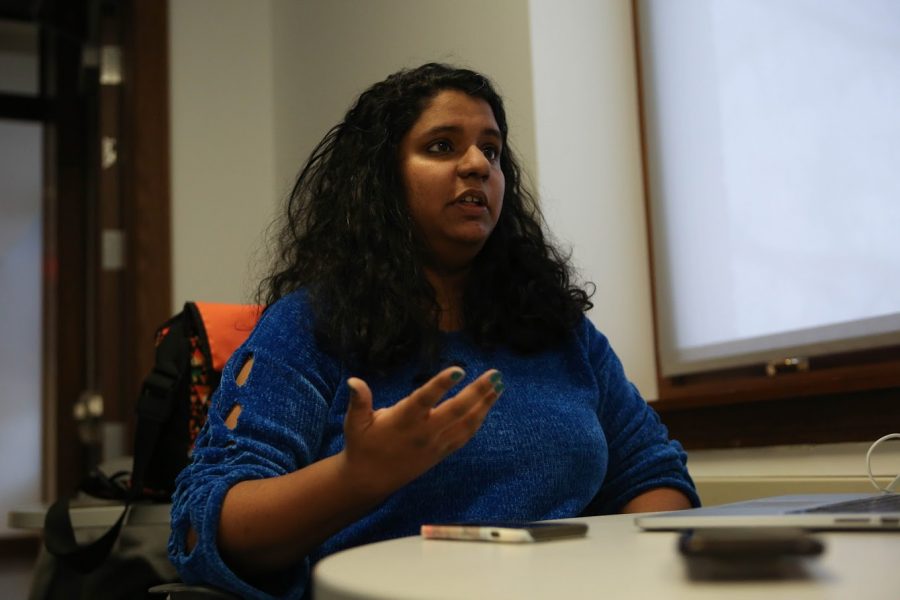Students prepare for upcoming entrepreneurship challenge
Junior Ananya Cleetus describes her mental health app, Anemone, during an interview on Wednesday in Lincoln Hall. Cleetus hopes to gain valuable feedback from the Cozad challenge.
January 27, 2020
The deadline for the Cozad New Venture Challenge, which welcomes students who have new business ideas, is on Feb. 3 with a $250,000 grand prize at stake.
Associate Director of Innovation and Entrepreneurship Student Programs Stephanie Larson said in an email, “The campus-wide Cozad New Venture Challenge organized by the Technology Entrepreneur Center is an educational experience for anyone to develop their ideas … In 2019, teams competed for over $250,000 in funding and in-kind prizes.”
This challenge has encouraged many students to pursue their desires more in-depth. Participants are provided with support and mentorship for their projects throughout the challenge to better their business ideas and prepare them for the competition aspect of the challenge.
As this challenge has been going on for more than 20 years, there have been changes to improve the structure and integrity of the challenge.
“In recent years we have focused more on the educational aspect of Cozad and removed the elimination rounds,” Larson said. “Now, to compete in the final event, the student needs to attend the workshop and complete deliverables asked of them. If they do this, then they can compete for funding and in-kind prizes at the final event in April.”
Get The Daily Illini in your inbox!
As the deadline approaches, there are already many applicants who are currently preparing for the competition ahead.
Micheal Skibsk, junior in Business, is in the midst of designing an app that allows the user to organize their schedule and predict the best time one should work on certain tasks.
“So what this app would do is would predict using machine learning algorithms to predict when the best time for a certain person to work on their projects using past data,” Skibsk said.
Currently, Skibsk is working on the research part of the project, as it’s still in its early stages of development, but he hopes to gain more experience throughout the challenge.
The Cozad challenge allows students to enter the competition regardless of how developed the business idea is since the main goal is to offer mentorship and resources for the participants.
“Students are not required to have a finished product or a prototype to take part. Requirements of the program include submission of an executive summary to start with,” Larson said.
However, some participants have been working on their design for a long period of time and hope to enter the challenge to better understand how the business ordeal works.
Ananya Cleetus, junior in Engineering, along with her partner Devin Dionne, junior in Business, entered their app Anemone into the challenge.
“It’s a mental health crisis app called Anemone and it’s unlike any other app that has really come before because it focuses on something called a crisis plan, which as of now is a pretty industry-approved standard thing used in a lot of therapy and hospitalization settings,” Cleetus said.
Cleetus has been working on Anemone for over a year and recently released the application in March of last year. She teamed up with Dionne this year to further develop their project and work through the competition.
The application, which can be downloaded for free, includes the crisis plan compilation that is easily accessible, various resources the user might need in times of distress, numerous coping skills used in therapy programs and a virtual grounding box used to remind the user of a positive memory.
“This combines a lot of the skills and tools that are already taught and approved in most psychiatric settings,” Cleetus said. But what it does is it makes (crisis plans) more accessible for people.”
Cleetus and Dionne said they believe their app Anemone is an important mental health resource that could potentially save people’s lives, as it provides crucial information that is easily accessible to all its users.
“Because ultimately this is something that’s going to be a tool for somebody who’s going through a really tough time,” Dionne said. And we want to make sure that the plan for us to put this out in the market is pretty well thought out because, like (Cleetus) said, this can be a life-saving tool for people.”
Cleetus and Dionne have joined the Cozad challenge in hopes of gaining valuable feedback from experienced professionals and potentially receiving funding to further develop their app and offer the best possible service.
“(Advertising) would be a big thing for us — the use of the funds just to get it out there — because since it’s going to be a mobile application,” Dionne said. “There are so many different mediums in which you can go to advertise products that could help us with different things like marketing,”
Larson said the Cozad challenge has become more of an educational journey for many participants throughout the years.
Participants such as Cleetus and Dionne are two of many who hope to use these resources at the Cozad challenge and expand their businesses.







